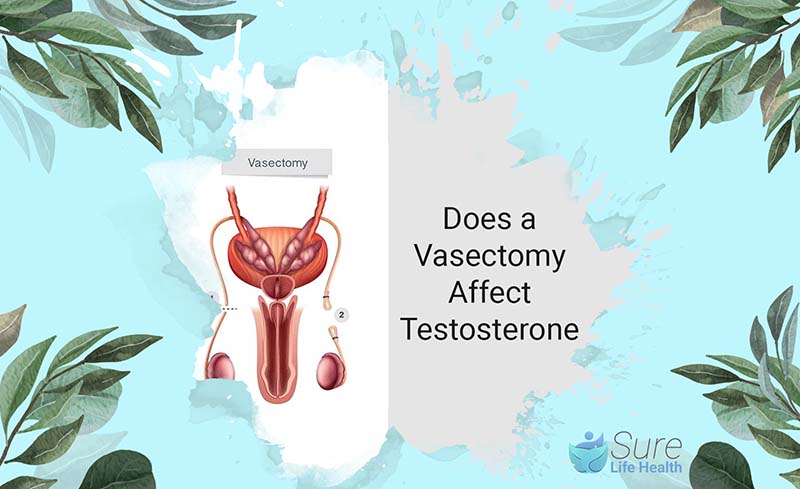A vasectomy, also known as male sterilization, is a simple procedure where the tubes carrying sperm are cut or sealed, preventing sperm from mixing with semen during ejaculation without affecting testosterone levels or sexual performance.
Despite common concerns, research indicates that a vasectomy typically doesn’t disrupt one’s sex life. In fact, some individuals even report improvement afterward. As for its impact on testosterone levels, sex drive, or performance? Not really. Testosterone levels usually remain unaffected, and the majority of people don’t observe any changes.
Contrary to misconceptions, a vasectomy doesn’t diminish masculinity or disrupt sexual function. Instead, it’s a reliable method for preventing pregnancy without causing any sexual issues.
However, like any medical procedure, there are potential drawbacks. You may experience temporary soreness or swelling in the area immediately after the procedure, but this typically resolves on its own. In rare cases, some individuals may encounter long-term issues such as persistent pain or inflammation. It’s essential to discuss these possibilities with your doctor before proceeding.
In summary, undergoing a vasectomy won’t impact your testosterone levels, sex drive, or sexual performance. Educating yourself about the facts and potential risks can empower you to make informed decisions about your reproductive health.
Does a Vasectomy Affect Testosterone?
A vasectomy is a straightforward procedure where the tubes carrying sperm from the testicles to the penis are either cut or sealed. This prevents sperm from mixing with the seminal fluid, known as semen, which is ejaculated during sex.
Even after a vasectomy, males will continue to ejaculate semen, but it won’t contain any sperm.
Importantly, a vasectomy doesn’t bring about any biological changes in males. This means it doesn’t mess with testosterone levels. In fact, a study conducted in 2018 confirmed that vasectomies have no long-term impact on testosterone levels in men.

7 Other Common Myths About Vasectomy
There’s a lot of talk surrounding vasectomies, covering everything from the procedure itself to potential risks and lifestyle changes. Let’s separate fact from fiction:
Vasectomy Is Painful
Fact: Not really. A vasectomy is usually not very painful. It’s a minimally invasive procedure done under local anesthesia, so you shouldn’t feel much during it.
Any discomfort or mild pain afterward can often be managed with over-the-counter pain medication.
Vasectomy Affects Sexual Function
Fact: Absolutely not. A vasectomy doesn’t affect your sexual function or satisfaction. Men can still maintain healthy erectile function, libido, and overall sexual performance after the procedure. It’s important to note that a vasectomy doesn’t protect against sexually transmitted infections, though.
Vasectomy Is a Complicated and Dangerous Procedure
Fact: Not true. Vasectomy is generally considered safe and straightforward. It’s done under local anesthesia and usually carries a low risk of complications.
Recovery is typically quick, with most men getting back to their regular routine within a few days.
Vasectomy Is Effective Immediately
Fact: Nope. After a vasectomy, it takes about 3 months or 15 to 20 ejaculations to clear any remaining sperm from the vas deferens.
During this time, it’s crucial to use another form of contraception to prevent pregnancy. A semen analysis is usually done afterward to confirm that no sperm are present before relying solely on the vasectomy for contraception.
A Vasectomy Is Irreversible
Fact: Not entirely true. While vasectomy is considered permanent, it can sometimes be reversed through a more complex surgical procedure.
However, reversals may not always be successful, so it’s essential to be sure about not wanting more children before getting a vasectomy.
Vasectomy Leads to an Increased Risk of Prostate Cancer
Fact: While there’s been some discussion, most studies haven’t found a significant link between vasectomy and prostate cancer.
It’s still important for men to stay vigilant about their prostate health by scheduling regular check-ups and screenings, regardless of whether they’ve had a vasectomy.
Vasectomy Will Affect Masculinity
Fact: Nah. While there might be some temporary hormonal changes after a vasectomy, they usually sort themselves out over time.
A vasectomy doesn’t mess with the testicles’ ability to produce testosterone, and any long-term effects on hormone levels are minimal.

Does Vasectomy Have Long-term Side Effects?
Like any surgical procedure, vasectomies carry a potential for side effects, although the risk is generally low. Here are some potential long-term side effects:
- Sterilization Failure: In rare cases, vasectomy may not effectively prevent pregnancy, leading to sterilization failure. However, this occurrence is uncommon.
- Chronic Pain Syndrome: Some individuals may experience persistent pain in the scrotal area, known as chronic pain syndrome, following vasectomy. This condition is rare but can occur.
- Sperm Granuloma: This is a harmless small lump that may form due to leaked sperm from the cut or sealed tubule. While it’s typically benign, it may cause discomfort in some cases.
A 2021 review found that getting a vasectomy doesn’t seem to raise the risk of some health problems, like autoimmune diseases, heart disease, sexual issues, or prostate cancer. Still, more research over a longer time is needed to be sure.
The American Urological Association has claimed that vasectomies don’t lead to a higher chance of getting a stroke, high blood pressure, dementia, or testicular cancer.
If you’re worried about any possible side effects from a vasectomy, either now or in the future, it’s a good idea to talk to a doctor. They can offer advice that fits your personal health situation and concerns.

Conclusion
For those considering a vasectomy, concerns about its impact on sexual function may arise. However, evidence indicates that vasectomies do not affect testosterone levels and typically have a positive effect on sexual function and satisfaction.
Vasectomies are also known for being safe, with a low risk of health issues both shortly after the procedure and in the long run. They’re considered a reliable way to prevent pregnancy.
It’s important to remember, though, that while vasectomies can sometimes be undone, it’s not always successful. You should only choose a vasectomy if you’re sure you don’t want children in the future. Talking to a healthcare provider can help you make an informed decision that’s right for you, giving you advice that matches your own situation and what you want.
Be sure to explore more insightful blogs from Sure Life Health, where we continue to shed light on the latest trends and breakthroughs in health and wellness.
Professor Gaye Cunnane, PhD, MB, FRCPI
As the Director of Health and Wellbeing at RCPI, Professor Gaye Cunnane is at the helm of initiatives aimed at enhancing the health and well-being of RCPI Trainers and Trainees. Her role extends beyond administration; she is also a respected clinical professor of rheumatology and a consultant rheumatologist at Trinity College Dublin (TCD) and St James’s Hospital. Prof. Cunnane’s medical journey began at TCD, where she graduated from medical school, and her path has been marked by both clinical and academic excellence.
After completing her basic clinical training in medicine, she embarked on PhD studies at University College Dublin and St Vincent’s University Hospital. Her research during this period was focused on prognostic markers in early inflammatory arthritis, a project that saw her collaborating with esteemed universities across Europe, including in Switzerland, The Netherlands, the UK, and Sweden.
Prof. Cunnane’s career took her to the University of California, San Francisco, where she spent three years delving into research on new treatments for lupus. Her academic prowess led her to the University of Leeds in 2001 as a senior lecturer, before returning to Ireland in 2003 to assume her current roles. She has also served as the National Specialty Director for Rheumatology training in Ireland, Programme Director for Basic Specialist Training with RCPI, and as a past President of the Irish Society for Rheumatology.
PUBLISHED ARTICLES
“Rheumatic disease differentiation using immunoglobulin G sugar printing by high-density electrophoresis”: Published in The Journal of Rheumatology, this study reflects her in-depth investigation into rheumatic diseases.
“Benefits of exercise in patients with rheumatoid arthritis: a randomized controlled trial”: This research work, highlighting the positive impact of exercise on rheumatoid arthritis, underscores Prof. Cunnane’s dedication to practical, patient-centered research.
Additionally, Prof. Cunnane has made notable contributions to the Annals of the Rheumatic Diseases, discussing early referral, diagnosis, and treatment of rheumatoid arthritis. She has also been involved in a study on the NCBI platform investigating exercise benefits in rheumatoid arthritis patients.
Professor Gaye Cunnane’s career is a testament to her commitment to improving patient outcomes in rheumatology through rigorous research, clinical excellence, and dedicated teaching. Her work continues to influence the field of rheumatology, both in Ireland and internationally.

